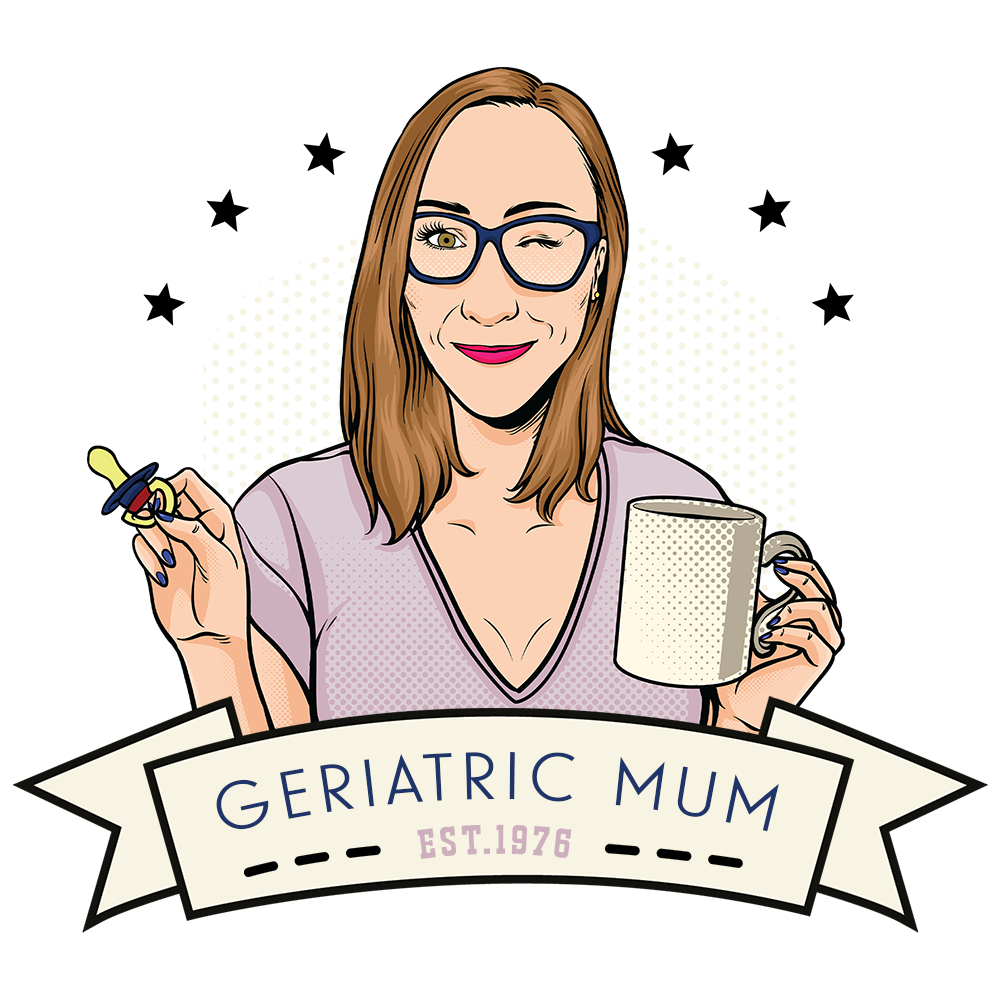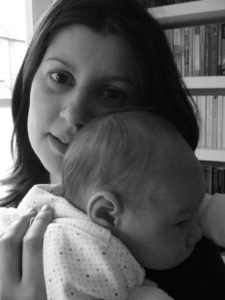As a busy mum of three, I have made every mistake under the sun when it comes to nutrition. I’m better now, but over the years I’ve finished off uneaten fishfingers, skipped meals, eaten way too late, crammed chocolate in at odd hours of the day, forgotten to drink anything other than tea and coffee and massively rushed my meals. Even now, 12-years into motherhood, I have to keep myself on track so that I have consistent energy. I have my go-to lunches that are just for me (no kid time!) and in the evening we all tend to eat the same food. Things like chicken wraps and good old cottage pie make it to the table and as a lover of food and cooking I make sure 95% of what we eat is homemade. Cooking can be seen as another thing to do, which it most certainly is with children, but I do find it relaxing and I like knowing what are children are consuming.
For A chat with this time, I interviewed Thalia, who is an online nutritionist who specialises in working with knackered mums. She was a ‘geriatric mum’ when she had her second child at 37.
Name Thalia Pellegrini (AKA Knackered Mums Nutritionist)
Age 47
GM – How was your journey to motherhood?
My journey to motherhood was challenging. We eventually had IVF and were so lucky that it worked for us. I was 35 when my first son was born. Motherhood completely changed my life. I’d always looked after myself, but that went out the window when my first child arrived. There were problems at birth and he was whisked off to NICU. We spent the first ten days in hospital. After being at home for just two days, I was readmitted for an infection. It was a tough start and I was quite ill. My baby and I being ill set the tone for the next year, and I didn’t properly recover from that first challenging month.
My son didn’t sleep for more than 45-minutes at a time at night until he was 14-months-old. I used to have to walk him for 20-minutes to get him to have any kind of nap in the day, usually short. I was absolutely wrecked. Society doesn’t talk enough about the impact of chronic sleep deprivation. I’d stagger to mum/baby groups, feeling absolutely shattered, to hear other mums saying, “He’s sleeping for 6-hours now!” or “She slept through!” – and I felt like such a failure. Why wasn’t my baby sleeping?
I adored my baby and he was such a happy chap – a total delight. Breastfeeding was a really smooth and positive experience for me and I’m so grateful for that. I was also deeply grateful to be a mum, because a few years before I didn’t think I would achieve my dream of having a child. In the early days I focused every ounce of my energy on him and ignored my well-being completely. When my second son came along two-years later, it dawned on me that I couldn’t be the mum I wanted to be if I wasn’t looking after myself as well.
GM – How old are your children now? and what age have you enjoyed the best?
My sons are now thirteen and eleven. Looking back, I adored the toddler stage – I just loved it. It was such hard work but my sons were a joy. I’m loving now too – they are fun to hang out with and increasingly independent, especially the teenager. I love to go out with him and just chat. It’s incredible watching my children change and develop – what a gift!
GM – Motherhood can be so knackering, why do you think this is?
It is knackering because we (mothers) tend to put our children’s well-being above our own. We are at the bottom of our to-do list – the kids pretty much always come first. When a woman first becomes a mum, it’s all-consuming and so overwhelming that personal health is an afterthought. That afterthought becomes a habit. Women HAVE to look after themselves in order to do the superhuman amount of work that motherhood requires. This self-care isn’t selfish, it’s vital in the same way mothers are. Most mums tell me that they have no time, but what they’re really saying is they spend all their time on everything and everyone else – and that is completely understandable. However, taking 5-10 minutes a day and eating well in that time can make all the difference.
GM – Why can women who have a baby in their late 30s / 40s experience extra tiredness?
One reason is certainly hormonal. In our late 30s and in our 40s, we may be starting to experience the impact of peri-menopause. The hormonal shifts that come with that, added to the reality of being post-natal, can be a double-whammy and it can leave women even more depleted.
GM – How can women who feel exhausted combat this tiredness?
It comes back to prioritising yourself – which can feel challenging. Prioritising doesn’t mean looking after your family less, in fact, when you have more energy, that to-do list feels less overwhelming and you have more to give. One of the main ways to do this is to look at what you’re eating (or what you’re not eating); how much do you move your body; how much sleep are you getting and do you prioritise that? What do you do just for yourself, if anything? None of these are changes that happen overnight. There’s a reason my peri-menopause program The Energised Mum Method is 6-months long. Small changes, consistently made, can be powerful. Choose one thing you know you could tweak for the better – breakfast for example – and do that for 7 days. Then another. Once good habits are set, you don’t think about them.
(Thalia’s free recipe collection called Fantastic in Five: Breakfast for Mums in a Hurry – get here)
GM – Why is nutrition key for women who are pregnant or have just had a baby?
Nutrition is key to both mother and child. We know that nutrition in pregnancy can impact our baby’s future health, and the healthier we are, the quicker our post-birth recovery will be. It is important to not get too bogged down by shoulds and shouldn’ts. It’s all about balance! Focus on good quality protein, complex carbohydrates (brown rice, wholewheat pasta and wholewheat or rye bread rather than the white versions), and I recommend lots of healthy fats, including omega 3s. Think oily fish, walnuts, ground flaxseed and eggs, and don’t forget that fruit and vegetables are carbohydrates. I always encourage mums-to-be to eat the rainbow, focussing on lots of different coloured fruit and veg at every meal. This provides lots of fibre, which is good for reducing pregnancy constipation, for example.
Research shows that taking a probiotic with lactobacillus rhamnosus during pregnancy can also help prevent urinary tract infections, gestational diabetes, pre-eclampsia, as well as prenatal and postpartum anxiety and depression, and women who take a probiotic through the third trimester may help to prevent eczema, allergies, and asthma in their babies.
A specific nutrient worth mentioning is choline – not strictly a vitamin or mineral – but it is crucial in pregnancy and breastfeeding. Choline is essential for a baby’s neurological development and signalling, and cognitive function, especially memory, focus and attention. We know that adequate intake may provide children with stress resilience and protection from anxiety. Good food sources are egg yolks, dairy, products from grass-fed animals, meat from organic or grass-fed animals and fish. If you’re vegan wheatgerm and pulses are also sources, though not as high. Post-birth I recommend grazing – little and often – to support your energy.
I encourage lots of vitamin C-rich foods for tissue repair – lots of brightly coloured fruit and vegetables; you need vitamin D too – get your face up to the sun if it’s between April and October, and if you’re not vegan, eat eggs and oily fish; you need magnesium and zinc too – go for spinach, pumpkin seeds, cashews, chickpeas, kefir, chard. Focus on food before reaching for supplements. When it comes to supplements, for most mums, a good quality prenatal/breastfeeding multi is enough, add in vitamin D if it doesn’t contain it.
GM – Share some key things that women who have young children, and who might be menopausal, can add to their life to feel more energised:
Get enough protein in your diet. Aim to have a portion of protein with every meal and every snack. That might be eggs, chicken, meat, fish, tofu, lentils, nuts or seeds.
Make sure you’re eating plenty of healthy fats – these are essential for our hormonal health as well as our mental health. Oily fish a few times a week, nuts, seeds and avocados are all sources of healthy fats.
More sleep – prioritise it! When kids are little, unbroken nights tend to be the norm, so even if it’s just a few nights a week, aim to be in bed an hour earlier.
Stay hydrated – mums often rely on caffeine to get through the day, but it’s a diuretic so it makes you wee more. Plenty of water is important. When you are dehydrated you are more likely to feel sluggish and get more headaches.
GM – Share 3 things that women need to think about eliminating to ensure increased (steady) energy:
This doesn’t make me very popular, but
- Booze
- Sugar
- Keep your caffeine down to a few cups a day
What can women, who are approaching the menopause, do to experience a better menopause?
Stop putting themselves at the bottom of that to-do list. Nothing changes if nothing changes. There is so much a woman can do for a more positive peri-menopause. It’s a window of time in life to really focus on the body and overall well-being. My 6-month group program The Energised Mum Method was created just for this. Everything from hormonal balance, gut health, liver health, a healthy relationship with food, sleep, movement and the biggie – managing stress. Each one is important to how we feel during this transition which can take anywhere from 4 to ten years. If a woman is struggling, it is important not to suffer in silence. Seek support. If the help you need isn’t forthcoming from the GP, ask to see another. Ask if there is a menopause specialist within the surgery. Women know their own body best so the message is to not give up. It can be hard to speak up when the menopause can change so much of how a woman feels, but it is important to know there’s so much great support and information out there. HRT can help lots of women and should be explored, but it’s not a magic bullet. A holistic approach alongside HRT can make a massive difference.
And lastly, a top lunch tip from Thalia:
“If you’re at home, a fresh tomato and basil fresh soup (you’ll find them in every supermarket) is a great base – just add in a tin of cannellini or butter beans for protein and heat. Ready in 5-minutes. If you’ve got a few more minutes, dry roast some sunflower seeds and add a top for extra nutrition.
Sandwiches are a great go-to and can be eaten on the run – just make sure you get some protein and healthy fats in your filling to keep you energised. I love cold roast chicken and sliced avocado or hummus with red pepper and grated carrot. Add a piece of fruit – I always have an apple in the bottom of my mum bag – and you’re ready to go.”
I don’t know about you reader, but I am definitely doing the sunflower seed addition – thanks Thalia!
Thalia’s website: click here
Thalia’s instagram: click here




